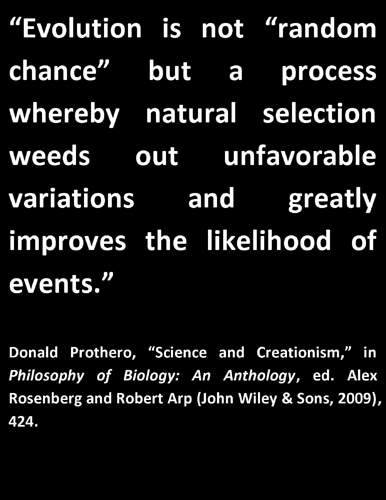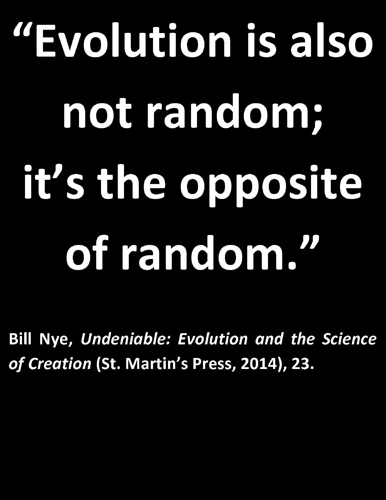I have taken your advice and googled “probability of evolution mathematically”. Now keep in mind that my comment was to seek either: (a) a clear stochastic methodology that would give mathematical credence to randomness in ToE, or (b) if it is on a par with physics and chemistry, an ab initio treatment to show/explain how similar ToE is to say, QM. I have yet to find anyone with a scientifically sound response. And yes, start with Rosenburg and find a proof or sound basis for ToE from his approach to PoS - note he is imo the most ardent evolutionist I have come across.
Without seeking anything for or against, I found the following (I note that almost every hit was either pro-creationism or anit-creationism, an unhealthy position for a major branch of the natural sciences! – perhaps you may add your personal theological insights to this discussion?):
- According to the most-widely accepted theory of evolution today, the sole mechanism for producing evolution is that of random mutation combined with natural selection. Mutations are random changes in genetic systems. Natural selection is considered by evolutionists to be a sort of sieve, which retains the “good” mutations and allows the others to pass away.
Since random changes in ordered systems almost always will decrease the amount of order in those systems, nearly all mutations are harmful to the organisms which experience them. Nevertheless, the evolutionist insists that each complex organism in the world today has arisen by a long string of gradually accumulated good mutations preserved by natural selection.”
And
- Those familiar with probability theory will recognize that one central difficulty with these creationist arguments stems from the fact that in any probability calculation, one must first very carefully define the ensemble space. As noted above, it makes no sense to consider, as an ensemble, all possible random assemblages of atoms into a protein chain, since that is not the scientific hypothesis of how alpha-globin and other biomolecular structures came to be. Instead, the only valid ensemble for this analysis is the set of all possible outcomes of an eons-long string of biomolecular processes, encompassing proteins, organisms, species and environments. But at present we have no possible way of even enumerating such an ensemble, much less determining the probability of any particular scenario or class of scenarios in this ensemble. Perhaps at some time in the far distant future, a super-powerful computer could simulate with convincing fidelity the multi-billion-year biological history of the earth, in the same way that scientists today attempt to simulate (in a much more modest scope) the earth’s climate. Then, after thousands of such simulations have been performed, we might obtain some meaningful statistics on the chances involved in the formation of some class of biological structures such as alpha-globin. Until that time, all such probability calculations are essentially meaningless.
Along this line, it is also important to keep in mind that the process of natural biological evolution is not really a “random” process. Yes, mutations are “random” events, but the all-important process of natural selection, acting under the pressure of an extremely competitive landscape involving thousands of other species as well as numerous complicated environmental pressures, is anything but random. This strongly directional nature of natural selection, which is the essence of evolution, by itself invalidates simple-minded probability calculations.”
And
3) Now let us attempt to apply this reasoning to evolution. What is the probability that an eye could arise gradually via known evolutionary mechanisms? In biological terms we are asking for the probability of evolving the genes necessary for constructing the eye, which immediately presents a problem. Complex structures like eyes do not arise from the action of a well-defined set of genes. Instead, there are many genes that play a role in eye formation, many of which serve other purposes as well.
But this objection is not yet fatal to the argument. While we may not be able to say specifically which genes are responsible for eye formation, we can reasonably assume there are quite a lot of them. Recall that genes are made from the four nucleotides adenine, thymine, cytosine and guanine (which we will abbreviate by A, T, C and G). Consequently, a gene can be modeled as a sequence whose elements are these four letters. As a conservative estimate, let us suppose that a gene one hundred letters in length is necessary to construct an eye. The actual number is surely far larger than this.
Therefore, the total number of possible outcomes in this case is simply the number of sequences of A’s, T’s, C’s and G’s that are one hundred letters long. This number is obtained by multiplying four by itself one hundred times, which is a very large number indeed. Only one of those sequences codes for the eye, as we know it. There are surely a fair number of trivial changes we could make in the precise gene sequence that will also produce the eye. Therefore, the number of favorable outcomes in this case will surely be greater than one. However, we can assert with some confidence that the number of favorable outcomes will be far smaller than the number of possible outcomes.
This seems to show that, while we may not be able to calculate precisely the probability of evolving the genes necessary for eye formation, we can still assert that the probability is very, very small.
Have we done it? Can we conclude that it is effectively impossible for evolution to have produced an eye? Many creationists would say that we could. You will find the argument described in the previous paragraph, presented in varying levels of detail, in a great many creationist outlets. Sadly, their analysis overlooks several crucial points.
Perhaps you have already spotted the flaw in this argument. In carrying out our calculation, we simply assumed that every hundred-letter gene sequence was as likely as any other. This assumption is completely unwarranted, for two reasons.
First, keep in mind that evolution works its magic by modifying preexisting structures. Consequently, the particular gene sequences likely to occur in a given generation are those attainable from preexisting sequences via known genetic mechanisms. As an example, suppose that in some organism we find the gene sequence ACGATCT. One source of genetic variation is the point mutation, in which an individual nucleotide is replaced in the next generation with a different nucleotide. Thus, it is perfectly reasonable to suppose that the offspring of our hypothetical organism will possess the gene sequence ATGATCT. By contrast, it is highly unlikely that we will encounter the sequence TGATAAG.”
So if we suppose, if we see the magic, if we say it is random but the mighty natural selection fixes it all – we end up with Rosenberg (at least he has the intellectual courage to admit this) that it is all semantics and debate – not a stochastic or ab initio treatment is sight.
Perhaps you can perform something like that and provide the rest of us poor scientists with your mathematical (not semantic) rendition of ToE.

